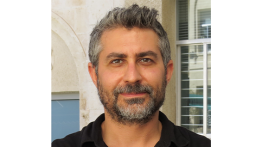Omar Dewachi, "Iraqibacter and the Biology of a History of War"
Tuesday, September 28, 2021, 7 - 8:30pm

As part of the Fall 2021 Intra-Disciplinary Seminar series, Omar Dewachi gives a talk that explores the rise of Iraqibacter, a moniker given to drug-resistant Acinetobacter baumannii, a superbug associated with the 2003 Iraq war. Tracing the histories and ecologies of this 'superbug' across landscapes of war injury in the Middle East, the talk focuses on how ethnographic inquiry reveals deeper entanglements of this killer microbe with the manifestations of long-term Western interventions and present-day conflict fallout across the region.
Omar Dewachi is Associate Professor of medical anthropology at Rutgers University. Before joining Rutgers in 2018, Dewachi taught social medicine and global health in Lebanon, where he co-founded the Conflict Medicine Program at the American University of Beirut. Trained in clinical medicine, public health, and anthropology, Dewachi’s work examines the social, medical and environmental impacts of decades of war and violence in Iraq and the broader Middle East. His book, Ungovernable Life: Mandatory Medicine and Statecraft in Iraq, is the winner of the prestigious New Millennium Book Award from the Society for Medical Anthropology in 2019. The book documents the untold history of the rise and fall of Iraq’s healthcare under decades of US-led interventions. His forthcoming manuscript, When Wounds Travel, chronicles close to two decades of ethnographic research and public health practice on war and displacement across the East of the Mediterranean. More specifically, the work documents the widespread of conflict-related injuries, Multi-Drug Resistant Bacteria, and the reconfigurations of healthcare and humanitarian geographies in Iraq, Syria, and Lebanon under decades of protracted conflicts.




